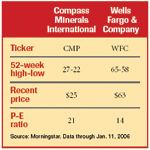Article
Stock Watch
Each month, we highlight two stocks selected as good bets by a premier analyst. The selections are based on several factors including growth potential, valuation, sector trends, competition, and dividends.
This month's guest analyst is Josh Peters, an Equities Strategist for Morningstar, the Chicago-based provider of investment research, and editor of the newsletter Morningstar DividendInvestor. He recommends companies partially on how they're valued, but largely on the quality of the dividends they pay.
Compass Minerals International

Peters says Compass Minerals has been largely overlooked by Wall Street in favor of more-high-profile businesses and companies. And while it's difficult to become enthused about rock salt, boring can turn exciting when there's a healthy dividend with a history-albeit a brief one-of steady increases. The dividend currently runs at the rate of $1.10 annually, fully 70 percent of earnings, an aggressive policy that underscores management's commitment to channel back cash into shareholders' hands. In the words of Compass' CEO, Mike Ducey, "We have a vision to create the greatest cash-flow-generating company in the salt business."
The dividend is well supported, and Compass Minerals is expected to keep pace with industry sales growth of about 5 percent a year. Peters looks for at least a 23 percent discount to fair value before buying. His trigger price is around $25, which would mean an attractive total return-yield plus the rate of long-term dividend growth-of about 10 or 11 percent.
Wells Fargo & Company
Wells Fargo is the nation's fifth-largest bank, with $453 billion in assets, and is the only one to garner an "Aaa" credit rating from Moody's Investors Service. It operates more than 6,200 banking and mortgage lending offices in North America and offers a robust line of consumer financial and brokerage services, including online banking, trusts, credit cards, and insurance.
It's specifically targeting growth in the mortgage industry, where scale is a big advantage; in fact, Wells Fargo is already the nation's top small-business lender, extending $13.6 billion in loans under $100,000 to small-business owners in 2004. The bank boasts an aggressive sales force, with the average customer using at least four of the bank's products, compared with two on average across the industry.
Peters feels that Wells Fargo's current dividend, at 45 percent of earnings, is secure, and that its reserves are quite large in comparison to actual losses, which helps protect it against future loan defaults. "A top corporate priority," says Peters, "is sharing growth with its owners through dividends." Last year's 8 percent increase marked the 18th straight year of growth; the average over the past 15 years is 17 percent.
Peters expects the bank to increase long-term earnings at a high single-digit clip. Morningstar's $77 fair value estimate is based on projected net income growth of 8 percent a year through 2009 and an approximate 18 percent average annual return on equity, both of which are either in line with or slightly below Wells' own targets.





